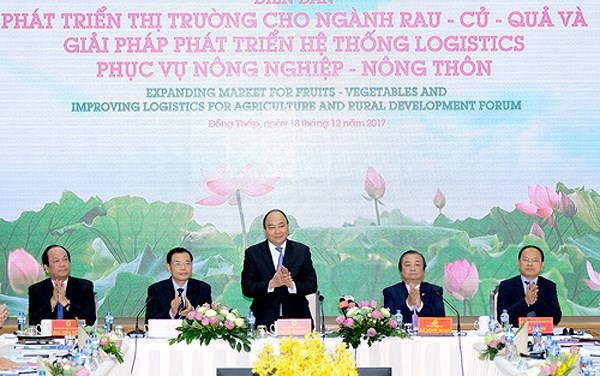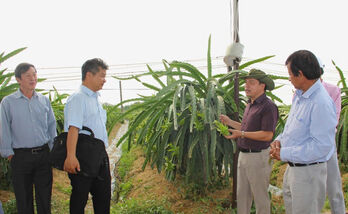PM urges better logistics for fruit, vegetable exports
Dong Thap (VNA) - Prime Minister Nguyen Xuan Phuc has asked the Mekong Delta region to improve logistics to increase fruit and vegetable exports to global markets.

Prime Minister Nguyen Xuan Phuc speaks at the event (Photo VNA)
Phuc spoke at a forum titled “Market Development for Fruit and Vegetables, and Solutions for the Development of Logistics Systems for Agriculture and Rural Areas” held in the Mekong Delta province of Dong Thap on December 18.
Phuc urged the region to continue to keep up with new trends in the global market and “take advantage of the fourth industrial revolution and apply advanced technologies in farming to produce the best quality fruit and vegetables.”
“Logistic plays a key role in enhancing competitiveness and promoting the global market for Vietnamese vegetables and fruits,” he said.
Bui Quoc Nghia, head of the Vietnam Logistics Institute, said the high cost of logistics was one of the barriers reducing the competitiveness of Vietnamese agricultural products in the world market.
Specifically, the ratio of logistic costs to Gross Domestic Product (GDP) in Vietnam is 20.8 percent, compared to 15.4 percent in China, 10.7 percent in Thailand, 13.5 percent in Asia Pacific, 9.2 percent in Europe, and 8.6 percent in North America.
The average ratio of logistics costs to GDP globally is 11.7 percent.
However, the Vietnamese logistics industry has great growth potential, according to the report Vietnam Logistics Market 2017, Nghia said.
Rapid economic growth as well as significant trade with a total value of 350 billion USD last year is expected to boost growth of the transport sector, he noted.
However, major hurdles facing the industry include underdeveloped infrastructure and an overloaded road network, he added.
Nguyen Xuan Cuong, Minister of Agriculture and Rural Development, said the potential for fruit and vegetable exports was huge.
“The ministry has focused on using modern technologies in agriculture in order to create high quality products, thus improving competitiveness and expanding export markets,” he said.
“Exports of fruits and vegetables are expected to continue to grow. The sector should develop associations for investing in hi-tech agriculture. Businesses should work with farmer collectives to establish concentrated raw material areas,” he added.
The minister said the growth of the agricultural sector would largely depend on export value and changes in the market.
It is essential for businesses and farmers to build production chains of safe fruits and vegetables and use hi-tech agriculture in order to reach the export target of 3 billion USD by the end of this year, he said.
Le Thanh, head of the Institute of Organic Agricultural Economics, said vegetables and fruits had become a bright spot among agricultural exports as they continue to see rapid growth.
He said the global demand for fruit and vegetable products had increased in recent years.
“Export enterprises, farmers and producers have worked closely in recent years, thus, the quality and design of the products has improved, creating a good reputation for Vietnamese vegetables and fruit,” he said.
Around 40 kinds of Vietnamese fruits and vegetables are exported to 40 countries and territories, including major export markets such as mainland China, Japan, the Republic of Korea, the US, Malaysia and Thailand.
Richard Courey, Chairman and CEO of Vision Transportation Group (VTG), said that transport logistics was an important sector of the economy and in Vietnam, represents 20 percent of GDP.
However, in more developed economies like Canada or New Zealand it represents less than 10 percent of GDP, he said.
In an export-oriented economy, where pricing is dictated by global markets, this means a larger portion of the economic pie is available to local farmers and processors rather than international shippers and foreign retailers, he added.
“Of all economic activities, agriculture is the most dependent on the transportation logistics network. And nowhere is this more visible applicable than in Dong Thap province and other provinces in Mekong Delta,” he said.
Due to limited port capacity, 80 percent of goods for export from the Mekong Delta are shipped via HCM City or Ba Ria-Vung Tau deep-water ports, he said.
“This ineffective logistic structure is not cost-effective and takes away profit from farmers as well as decreases product competitiveness on the international market,” Corey said. “We recommend Dong Thap incentivise and prepare a logistics foundation to energise the expanded production of higher-value fruits and vegetables in the Mekong Delta.”
The province should also design transportation infrastructure that will offer the most effective logistical mix for organic and sustainable produce to enter and compete in major consumer markets, he said.
The province should also embrace new technology that offers human and environmental protection and assist in the uptake of technological transfer, he added.
The forum saw the signing ceremony of the Memorandum of Understanding (MoU) on the development of logistics and infrastructure development in Dong Thap province.
The signing was done between the province, the Institute of Organic Agricultural Economics, and a venture of the Investors of Vietnam Infrastructure Development and Real Estate Corporation (VIPD), the Sunny World Property Development Corporation, and the Saigon Gia Dinh Real Estate Joint Stock Company.
Under the MoU, the venture will finance research and development for a logistics and infrastructure development strategy in Dong Thap province.
The venture will promote investment in infrastructure development and urban and logistics projects.
In addition, the provincial People’s Committee, Institute of Organic Agriculture Economics, Lavifood Corporation and Greenland Business Group signed an agreement to promote the export of agricultural products from Vietnam to China via an official channel for the first time with a value of at least 500 million USD in the first two years and a gradual increase in coming years.
The Greenland Business Group is a wholly owned subsidiary of China Greenland Group, a leading importer and exporter of agricultural products in China and the Asia-Pacific region.
The forum, organised by the Institute of Organic Agricultural Economics and the Dong Thap provincial People’s Committee, was held to promote exports of Vietnamese fruits and vegetables as well as investment in the value chain of fruits and vegetables.
Vietnam is expected to earn 3.5 billion USD from shipping vegetables and fruits this year, representing a year-on-year growth of 45 percent, according to the Ministry of Agriculture and Rural Development.
In 2017, China, Japan, the US, and the Republic of Korea were the four largest importers of Vietnamese fruits and vegetables, importing 2.15 billion USD, 102 million USD, 82 million USD and 73 million USD, respectively.
China was the dominant import market for Vietnam’s fruits and vegetables.
Japan, UAE, and China posted rising import turnover of Vietnamese fruit and vegetables, increasing by 66.1 percent, 58 percent, and 53.1 percent, respectively.
The country imported 1.25 billion USD in the first 10 months of the year, representing a year-on-year surge of 70.8 percent.
After attending the forum, Prime Minister Nguyen Xuan Phuc visited Thuan Tan Club in Tan Thuan Tay commune, Cao Lanh city, Dong Thap province – a venue for Mekong Delta residents to share agricultural production experience./.
VNA
| Share |
-
 Collective economy—a sustainable direction to escape poverty
Collective economy—a sustainable direction to escape poverty
- Improve the operations and management of agricultural cooperatives
- Import-export State budget revenue increases 9.3%
- Tay Ninh to have 540 cooperativesby the end of 2025
- Vietnam-Algeria trade surges 200% in 10 months
- Accelerating public investment capital disbursement


